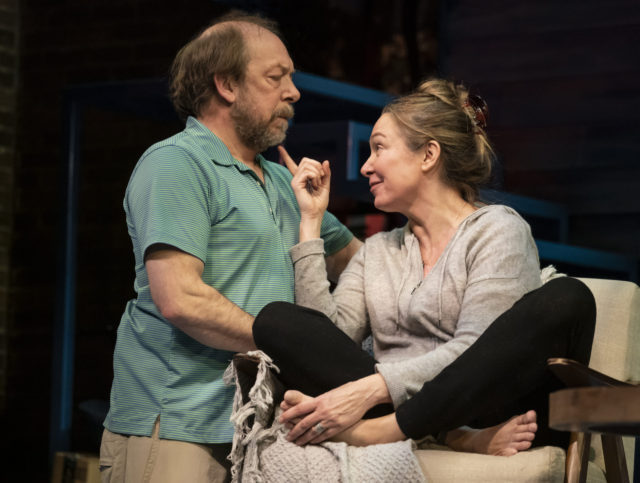
The Tyrone family faces the coronavirus in new streamlined Audible production (photo by Joan Marcus)
LONG DAY’S JOURNEY INTO NIGHT
Audible Theater’s Minetta Lane Theatre
18 Minetta Lane between Sixth Ave. and MacDougal St.
Through February 20 (no shows Monday and Friday), $57-$97
www.audible.com
longdaysoffbroadway.com
Jonathan Miller’s 1986 Broadway revival of Long Day’s Journey into Night created an uproar because the characters spoke over one another rather than treating Eugene O’Neill’s dialogue like gospel. Purists may also be unhappy with Robert O’Hara’s modern-day streamlined adaptation of the Pulitzer Prize-winning classic about a dysfunctional family, but audiences at Audible’s Minetta Lane Theatre, where O’Hara’s version opened tonight for a four-week run before being available on audio, may feel differently — or not.
As the crowd enters the theater, a large onstage monitor plays a loop of clips from CNN about the Covid-19 crisis and the 2020 presidential election. Clint Ramos’s multilevel set is strewn about with Fed Ex and Amazon boxes, a stack of masks, and a bar in the back. The coronavirus has come to the Tyrone family, who’ve been fast-forwarded into the twenty-first century.
O’Neill wrote the semiautobiographical play in 1941 and set it in 1912; O’Hara has moved it up more than a hundred years but hasn’t altered a single word. However, he has made significant cuts to the text, trimming the show down to a too-lean 110 intermissionless minutes; the play usually runs more than three hours and two breaks. Although much of the depth is lost, the production is still compelling, primarily because of excellent performances by real-life husband and wife Bill Camp as actor James Tyrone and Elizabeth Marvel as Mary Tyrone, a morphine addict who can’t face reality.

James Tyrone (Bill Camp) tries to take a break while his wife, Mary (Elizabeth Marvel), shoots up in off-Broadway O’Neill revival (photo by Joan Marcus)
The Tyrones’ older son, Jamie (Jason Bowen), was groomed to follow in his father’s footsteps but instead is a ne’er-do-well writer who spends all his money on booze and hookers. Younger son Edmund (Ato Blankson-Wood) is seriously ill, even if local Dr. Hardy says otherwise, thinking it might be a fever Edmund caught in the tropics. In O’Neill’s text, Jamie has tuberculosis — pretty much a death sentence in 1912 — but in this production it is clear that he has the coronavirus, and the family’s varying attitudes about his diagnosis are reminiscent of the start of the pandemic, before much was known about Covid-19.
O’Hara turns most of the focus on Mary; less time is spent on the others and their concerns inside and outside the house, from careers to alcoholism. Usually, James, Jamie, and Edmund only talk about Mary heading into the spare room, where she takes her morphine, but here we clearly see her sitting at a small table and shooting up, visible through a cutout in the back brick wall. It’s a disturbing image, causing a different kind of visceral reaction; it also made me wonder why one of the characters doesn’t just go upstairs and take the syringe and drugs away from her, a thought that never occurred to me in other productions I’ve seen. (Those include the aforementioned 1986 adaptation with Jack Lemmon, Bethel Leslie, Peter Gallagher, and Kevin Spacey, Jonathan Kent’s 2016 Broadway revival with Gabriel Byrne and Jessica Lange, and Sir Richard Eyre’s 2018 presentation at BAM with Jeremy Irons and Lesley Manville.)

Real-life husband-and-wife Bill Camp and Elizabeth Marvel get frisky in Long Day’s Journey into Night (photo by Joan Marcus)
The emotions between James and Mary are palpable, whether they’re flirting with each other or in a tense standoff; Camp (The Crucible, The Queen’s Gambit) and Marvel (Hedda Gabler, Homeland) display an instant chemistry that never lets up, enhanced by Yee Eun Nam’s abstract projections that reveal Mary’s inner turmoil. But the sons feel more distant and underdeveloped; there’s no longer the necessary back story to make us care about them, and neither Blankson-Wood (Slave Play, The Rolling Stone) nor Bowen (The Play That Goes Wrong, If Pretty Hurts Ugly Must Be a Muhfucka) is given enough to do.
In a production note, O’Hara explains, “The O’Neill Estate has allowed us to imagine this glorious play into the future that we are currently living through. . . . In both its concept and its brevity, this version is not meant to be anything other than an exploration of living in the time of a pandemic through the story and language of one of our greatest playwrights.” In updating the work, Tony nominee and two-time Obie winner O’Hara (Slave Play, Bootycandy) has left the skeletal structure but has removed a large chunk of the soul. And it’s one thing to perform this adaptation live onstage, with a full set, but I can’t imagine how it would work as an audio piece, without the props that place the Tyrones firmly in the Covid era.